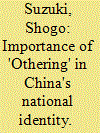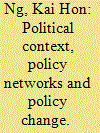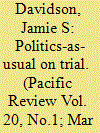|
|
|
Sort Order |
|
|
|
Items / Page
|
|
|
|
|
|
|
| Srl | Item |
| 1 |
ID:
076781


|
|
|
|
|
| Publication |
2007.
|
| Summary/Abstract |
Terrorism has become a challenge to which Southeast Asian studies need to respond. This article scrutinizes political and economic developments in regard to democracy and poverty in Southeast Asia, in particular the degree of change, and studies their influence on terrorism. The main question being asked here is whether external support for political and economic development could contribute to the Southeast Asian battle against terrorism. At the same time, this article seeks ways in which the international community, especially Europe, could support and participate in Southeast Asian efforts to address the root causes of terrorism. Finally, a global quantitative analysis of relevant factors is undertaken, and global conclusions are related to the developments and processes observed in Southeast Asia, especially in Indonesia. On the basis of the analysis, it can be established that some of the root causes of terrorism are indeed related to poverty and the lack of democracy. While it is clear that terrorist strategies to address these grievances by targeting innocent civilians are unacceptable, grievances related to poverty and the lack of democracy are perfectly legitimate. It seems that in order to inhibit individual terrorist motivations, democratization of political systems would do some good. However, the main economic and political grievances that are associated with the growth of terrorism are related to transnational communities. Thus, while Southeast Asian countries should continue to develop and democratize, they should also work together with the international community to democratize the international structures of governance.
|
|
|
|
|
|
|
|
|
|
|
|
|
|
|
|
| 2 |
ID:
076780


|
|
|
|
|
| Publication |
2007.
|
| Summary/Abstract |
Recent studies have increasingly argued that the Chinese leadership uses Japan's imperialistic past as a tool for domestic and political bargaining. However, this argument fails to appreciate the embedded nature of negative memories within China. This article forwards an alternative argument by situating Japanese militaristic history within Chinese national identity. By examining a wide range of Chinese primary sources often underutilized by International Relations (IR) analysts, it moves beyond narrow, elite-centred explanations. The article argues that modern China's national identity has been characterized by an acute sense of 'victimhood' arising from its turbulent interactions with International Society, and that Japan plays an important role as an 'Other' which enhances China's self-image as a 'victim'. Furthermore, it claims that Japan's emergence as an 'Other' in China's national identity is a by-product of China's attempts to regain its social and moral legitimacy within a post-Cold War International Society increasingly dominated by the Western powers. By highlighting the deeply entrenched nature of Japanese imperialist history in China's national identity, the article also shows that history is more than just part of a 'toolkit' that can be rationally utilized by the political elite, and that states are moral agents that are deeply affected by history.
|
|
|
|
|
|
|
|
|
|
|
|
|
|
|
|
| 3 |
ID:
076783


|
|
|
|
|
| Publication |
2007.
|
| Summary/Abstract |
Central to the debates on the transition of Hong Kong to Chinese sovereignty is how this process has affected change in the policy process and policy outputs. Many see policy change as a result of the evolving political environment in Hong Kong following the political transition. This article, however, adopts the notion of policy networks and argues that the analysis of policy change cannot be reduced to a simple contextual stimulus - the policy alteration model. A case study - 'the development of civic education' - demonstrates the importance of policy networks, as a particular structure of government and group relations in decision making, in explaining the course of policy change. It is apparent that the relationship between regime change and political liberalization, on the one hand, and established networks, on the other, tends to be complex and dialectical in Hong Kong. Despite the importance of sovereignty transition and political restructuring, the effect of contextual factors on public policy greatly depends on the nature of the network involved
|
|
|
|
|
|
|
|
|
|
|
|
|
|
|
|
| 4 |
ID:
076782


|
|
|
|
|
| Publication |
2007.
|
| Summary/Abstract |
This article explores to what extent to local pro-reform actors matter in Indonesia through the prism of anti-corruption campaigns in the country's regions. I argue that the rash of anti-corruption campaigns and related trials involving legislative members, especially from mid-2004 onward, can be attributed neither to the resources lavished on anti-corruption organizations based in Jakarta, nor to the popularity of President Yudhoyono's anti-corruption rhetoric. Instead, it can be traced to a particular anti-corruption campaign that began in earnest in 2002 in Padang, West Sumatra. Using a multi-dimensional approach, a small group of activists relentlessly pursued their newly elected provincial legislators to be accountable to their democratic mandates and as important, to respect the rule of law pursuant to new national anti-corruption legislation. The guilty verdicts of May 2004 galvanized similar groups across the country to investigate their respective legislative bodies. This exemplary case of societal accountability also demonstrated the leverage activists can gain over local politicians when they forge coalitions with other elite actors, especially those in Jakarta. I further explore two anti-corruption cases in the province of West Kalimantan to place post-Padang developments in their proper perspective. If hopes were raised that regional anti-corruption movements-based on the Padang model-might accomplish more than sensational trials but help consolidate democracy at the regional level by holding elected officials accountable, these two examples show how fleeting these expectations might be. The trials that took place but which produced no convictions resulted from the fallout of local political tussles, and not from local civil society organizations galvanized by the ideals of transparency and good governance.
|
|
|
|
|
|
|
|
|
|
|
|
|
|
|
|
| 5 |
ID:
076779


|
|
|
|
|
| Publication |
2007.
|
| Summary/Abstract |
After a temporary downturn in many Asian states after the 1997 Economic Crisis defence expenditures are rising again. Although most states put internal and transborder security issues at the top of their list of potential threats, an examination of recent trends in regional defence expenditure trends and weapons acquisition patterns belies this. Resources are being directed predominately toward externally oriented weapons systems such as fighter aircraft, surface ships, submarines, and missiles of all types. The dramatic accumulation of such potentially destabilizing weapons systems, particularly in Asia's traditional flashpoints, risks fuelling competitive arms processes throughout the region.
|
|
|
|
|
|
|
|
|
|
|
|
|
|
|
|
|
|
|
|
|